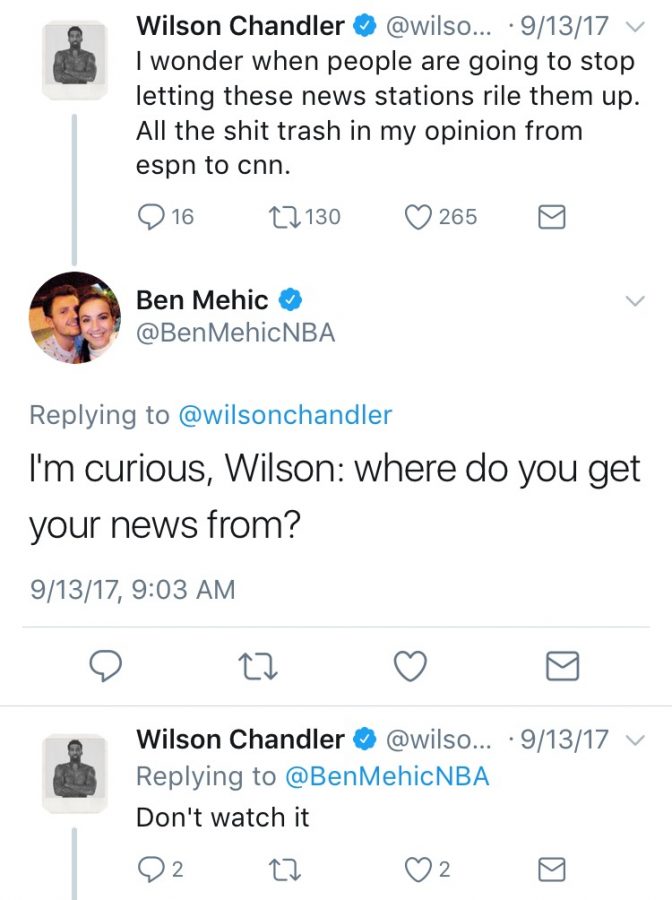Ben Mehic, Guest Contributor
As a result of a contentious presidential election, the term “media” has been used to generalize the few (yet often most boisterous) who give the complex profession(s) stains on its hypothetical shirt.
We’ve heard it time and time again, arguably now more than ever: the media is full of liars. It’s biased information. Hell, it’s even fake news.
But trying to process the previous statements becomes impossible without knowing where and to whom they’re being directed towards.
“The media is full of liars.” Which media are you talking about and who are the people creating false information that’s deemed them worthy of getting egg on their face? Better yet, have your assumptions that all “media” is bad created a false reality in which you’ve determined its worth, or lack thereof, before even consuming said “media” properly?
On Wednesday morning, I logged onto Twitter – one of my primary sources of information gathering. It’s up-to-date, could be accurate depending on who you’re following and it’s interactive. Twitter, if used properly, can be the most beneficial tool for observing news. But it can also be the opposite.
As an NBA writer, I follow hundreds of basketball players – from LeBron James to Jan Vesely and everyone in-between. I normally gloss over their tweets because it mostly consists of nauseating inspirational quotes and workout videos. But Denver Nuggets forward Wilson Chandler tweeted something that caught my eye on Wednesday.
“I wonder when people are going to stop letting these news stations rile them up. All this (expletive) (is) trash in my opinion – from CNN to ESPN.” – @wilsonchandler, 9:02 a.m., Sept. 13, edited for clarity purposes
So, I replied.
“I’m curious, Wilson: where do you get your news from?” -@BenMehicNBA, 9:03 a.m., Sept. 13
“Don’t watch it.” – @wilsonchandler, 9:04 a.m., Sept. 13
Chandler, based on his Tweets, doesn’t watch the television for news. He’s not alone. According to the Pew Research Center, only 27 percent of people aged 18-to-29 watch television news. Half of the millennial-aged population obtains their news information online.
Therein lies the issues.
Like most young people, Chandler doesn’t turn on the television to get news updates (but he still has an opinion on the produced content, whether it’s right or wrong). He checks his Twitter and probably doesn’t have many guidelines for who he’s following in terms of journalists – and that term “journalists” has become blurry too.
Without any filter, Chandler – and thousands of other millennials – refreshes his Twitter page and reads his timeline, most likely. Some of the information he gets might be accurate. But by those standards – by arbitrarily following people, some of whom aren’t credible – most of it might not be accurate. Really, there’s no way to tell. All of it could be 100 percent true. And all of it could be 100 percent false.
Is that the media’s fault? Or is it the consumer’s?
Nowadays, anyone can produce content. Anyone can create a Twitter page, a website or a blog. People, like Chandler, can complain about the media, but don’t acknowledge their poor consumption habits. Is CNN really bad, after all, or are we focusing on the few mishaps that have occurred within the organization?
CNN was nominated for 18 news and documentary Emmy Awards in July – the most the network has ever gotten. They received nominations for their coverage on the Pulse nightclub massacre, a documentary on mass extinctions and their coverage of Syria. That – undoubtedly – is all legitimate, serious reporting. And it’s all CNN.
The same, to a much lighter and less important degree, is true for ESPN. For every Stephen A. Smith rant, you can find an in-depth piece with advanced analytics by Zach Lowe on the organization’s website.
If you want to look for the good, you can find it. If you want to complain about something you’re not even consuming, you can do that too.
But let’s stop pretending all “media” is bad. Because it isn’t. News judgement or people’s willingness to search for substantive information? Well, that’s another story.


















![President Todd Pfannestiel poses with Jeremy Thurston chairperson Board of Trustees [left] and former chairperson Robert Brvenik [right] after accepting the university's institutional charter.](https://uticatangerine.com/wp-content/uploads/2023/10/unnamed.jpeg)



















































































































